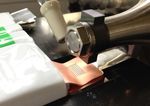Electrical contacting of current collector foils for lithium-ion batteries using conductive adhesives - Helene Jeske, Linsen Fu, Yuechen Wu, Maja ...
←
→
Page content transcription
If your browser does not render page correctly, please read the page content below
Electrical contacting of current collector foils for lithium-ion
batteries using conductive adhesives
Helene Jeske, Linsen Fu, Yuechen Wu, Maja Kandula, Klaus Dilger
Institute of Joining and Welding, TU Braunschweig, Langer Kamp 8, 38106 BraunschweigSTATE OF THE ART
Resistance spot, ultrasonic or laser beam welding
are mainly used to join battery cells in the production
of battery assemblies
Each of these welding techniques has it´s own
characteristics, depending on the material properties
and contact geometry
Access to the joint must be ensured, often on both
sides, which can have a negative effect on the joint
geometry or the required installation space
Different types of materials must be joined, which
poses major problems from a metallurgical and
production engineering point of view
Welding processes involve heat input, which should Resistance Spot Welding Laser beam and ultrasonic welding
be locally limited in order not to damage the battery https://huysindustries.com https://www.tu-braunschweig.de/ifs
cells
Advanced Battery Power | 28.-29.April 2021 | ifs | Helene Jeske | Seite 2
Institut für Füge- und
SchweißtechnikCHALLENGE: ELECTRICALLY CONDUCTIVE ADHESIVES
Contacting the aluminum and copper foil by using electrically conductive
adhesives:
epoxy resins filled with silver particles or graphite and carbon black
curing temperature and time, different amount of silver particle,
graphite and carbon black are investigated
samples are investigated in destructive lap shear tests regarding
their mechanical strength compared to ultrasonic welded specimens
contact resistance tests (four-point resistance method) were used to
characterize the conductivity compared to ultrasonic welded
specimens
This joining technique based on conductive adhesives allows other
design principles and enable more form flexibility or layer quantity
Advanced Battery Power | 28.-29.April 2021 | ifs | Helene Jeske | Seite 3
Institut für Füge- und
SchweißtechnikJOINING BY SILVERFILLED CONDUCTIVE ADHESIVES
Joining surface:
Ultrasonic welding: 7x11 mm
Bonding:25x25 mm
5 mg per layer
5x aluminum + 5x copper
Elecolit 3025 (2K) Elecolit 3656 (1K) Elecolit 1400 (1K)
(Panacol) (Panacol) (Panacol)
Silver content [w.-%] 84 87 86
Curing temperature at 180 ˚C \ 60 min \
Curing temperature at 120 ˚C 15 min \ 15 min
Curing temperature at 80 ˚C \ \ 30 min
Curing temperature at 25 ˚C 16 h \ \
Advanced Battery Power | 28.-29.April 2021 | ifs | Helene Jeske | Seite 4
Institut für Füge- und
SchweißtechnikJOINING BY GAPHITE & CARBON BLACK FILLED CONDUCTIVE ADHESIVES
Polyvertec 3452 and H1 (Schill+Seilacher) Characteristic values
Tensile strength 70 MPa
Mixing viscosity at room temperature 330 mPas
Pot life at room temperature 150 – 180 minutes
Curing conditions at 60 °C for 3h in heat press at 10 bar and post-cure at 60°C for 24h in batch oven
Graphite ACROS Organics: 30, 40 and 50 w.-%
Graphite & carbon black mixture: 30, 40 and 50 w.-%
Bonding:25 x 25 mm
3 mg per layer
5x aluminum foil + 5x copper foil
Advanced Battery Power | 28.-29.April 2021 | ifs | Helene Jeske | Seite 5
Institut für Füge- und
SchweißtechnikMECHANICAL PROPERTIES
tensile shear strength of silverfilled epoxy resin and tensile shear strength of graphite and
ultrasonically joined samples carbon black filled epoxy resin
4 4
3,5
tensile shear strength [MPa]
3,5
tensile shear strength [MPa]
3 3
2.5 2.4
2,5 2,5
2 0.8
2
1.1 1.1 1.1 0.8
1.2 1.2 1,5
1,5 0.9 1.0 1.0
1.0
1 1
0.6
0,5 0,5
0 0
Ultrasonic joining at 50 and 100 Joule and vibration amplitude at 20, 30 and 40 µm (blue)
Elecolit 1400 and 3656 silver filled epoxy resins (green) – best performance
DIN EN 1465
Polyvertec 3452 & H1 epoxy resin (red)
Advanced Battery Power | 28.-29.April 2021 | ifs | Helene Jeske | Seite 6
Institut für Füge- und
SchweißtechnikELECTRICAL PROPERTIES
electrical properties of silverfilled epoxy resin and electrical properties of graphite and carbon
ultrasonically joined samples black filled epoxy resin
1,4 500
1.15 450
contact resistance [mΩ]
1,2
contact resistance [mΩ]
400
1,0 350
0,8 300 261
0.37 250
0,6
200 164
0.26 0.32 139
0,4 150 108
91
0.18 0.19 0.11 100
0,2
50 7
0,0 0
Ultrasonic joining at 50 and 100 Joule and vibration amplitude at 20, 30 and 40 µm (blue)
TU-BS: Institute for Microtechnology
Elecolit 1400 and 3656 silver filled epoxy resins (green)
www.imt.tu-bs.de
Polyvertec 3452 & H1 epoxy resin (red), high contact resistance
Advanced Battery Power | 28.-29.April 2021 | ifs | Helene Jeske | Seite 7
Institut für Füge- und
SchweißtechnikSUMMERY & OUTLOOK
The focus of this work was to identify adhesives systems and parameters to evaluate
whether conductive adhesives have the potential as an alternative joining system for cell
contacts
The tensile shear strength of the bonded specimens is higher compared to specimens
which are joined by ultrasonic welding
The conductivity of the ultrasonically welded specimens is higher than that of the bonded
specimens with silver filled epoxy resin
The conductivity of bonded specimens with graphite and carbon black filled epoxy resin is
lower comparable to ultrasonically joined and bonded specimens with silver filled epoxy
binder
Dr. Helene Jeske
Reduction of adhesives amount per layer and a better incorporation of graphite and Department of fiber composites
carbon black in the epoxy resin could improve the electrochemical performance and electromobility
Institute of Joining and Welding
phone +49 531 391-95591
h.jeske@tu-braunschweig.de
Advanced Battery Power | 28.-29.April 2021 | ifs | Helene Jeske | Seite 8
Institut für Füge- und
SchweißtechnikYou can also read



























































